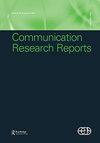Of robots and robotkind: Extending intergroup contact theory to social machines
IF 1.9
Q2 COMMUNICATION
引用次数: 1
Abstract
ABSTRACT This study seeks to advance how intergroup dynamics can help us better understand the relations between humans and robots. Intergroup contact theory states that negative feelings toward an outgroup can be reduced through controlled intergroup contact. This study tests this theory by having study participants interact with either a human (member of the ingroup) or large humanoid robot (member of an outgroup) and measuring changes in social distance before and after the interaction. The findings suggest that robotkind is a distinct social group separate from humankind and as predicted by intergroup contact theory, exposure to a specific robot can override held prejudices against robots as a social group.关于机器人和robotkind:将群体间接触理论扩展到社会机器
本研究旨在推进群体间动力学如何帮助我们更好地理解人与机器人之间的关系。群体间接触理论认为,通过有控制的群体间接触,可以减少对外群体的负面情绪。这项研究通过让研究参与者与一个人(内组成员)或大型人形机器人(外组成员)互动来测试这一理论,并测量互动前后社会距离的变化。研究结果表明,机器人是与人类不同的一个独特的社会群体,正如群体间接触理论所预测的那样,接触特定的机器人可以消除人们对机器人作为一个社会群体的偏见。
本文章由计算机程序翻译,如有差异,请以英文原文为准。
求助全文
约1分钟内获得全文
求助全文

 求助内容:
求助内容: 应助结果提醒方式:
应助结果提醒方式:


